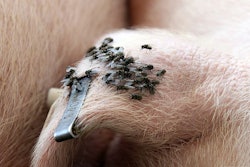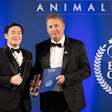
In the ongoing battle against climate change and with environmental concerns becoming greater, the British Veterinary Association (BVA) has urged the public to consider insect-based pet food for their cats and dogs. Using insects as a source of alternative protein may be a fairly new, and not yet completely mainstream, practice, but as it’s a much more sustainable resource more consumers are seeing the environmental benefits. It’s no surprise, then, that the insect protein industry is predicted to be worth US$1.3 billion by 2025.
Not only is insect-based pet food lauded as an incredibly eco-friendly option for pet owners, it also beats the more traditional “treat” foods, such as an expensive steak. When comparing the two options, BVA President Simon Doherty told BBC News: “Actually the danger is that a diet of top steak wouldn’t be nutritionally balanced. It’s much better to buy a balanced pet food (whether or not it contains insects).”
The UK’s first insect-based dog food, Yora, went on sale in January 2019, and founder Tom Neish said: “Dogs require animal protein in their diets, and traditionally this has come in the form of traditional meats like beef or chicken. However, as global populations rise, food supply is becoming a critical issue. Farming conventional livestock is very resource intensive, requiring vast quantities of land and water, both of which are becoming increasingly scarce. As a result, we have to consider alternative sources of protein — for both people and pets — and insects offer a viable solution.
“Imagine the cumulative environmental impact if we can wean the world's pets off meat and onto insects,” Neish said. “It’s up to all of us to take steps to accelerate the transition to low carbon products and services and conserve our natural resources.”

















